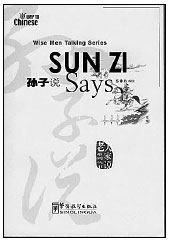A dip into Chinese wisdom
As the saying goes, "If an old dog barks, he gives counsel."
Old men, who walk more roads, eat more rice, read more books, have more experiences, enjoy more happiness, and endure more sufferings, are knowledgeable, and have rich life experience. What they say is mostly wise counsel. Why don't we listen to what they say?
The Spring and Autumn (722-481 BC) and Warring States (475-221 BC) periods of Chinese history were a golden age for ancient Chinese thought. Various schools of thought emerged and contended with one another, including the Taoist, Confucian, Mohist, Logicians, Legalist, Military and Yin-Yang schools.… Numerous and well-known, these schools of thought were as brilliant as the Milky Way.

All these schools managed to hand down an abundance of their classical works to us. These classical works contain many wise sayings and profound insights into philosophical theory which are still worthy of study today.
We have compiled these nuggets of wisdom uttered by the venerable old men of the ancient schools of thought into this series, Wise Men Talking, and added explanatory notes and English translations for the benefit of both Chinese and overseas readers fond of traditional Chinese culture.
Sun Zi's name was Sun Wu with the courtesy name Changqing. He was a native of the State of Qi during the late Spring and Autumn Period. Originally his family name was Tian. As his grandfather Tian Shu rendered outstanding service in leading an expedition against the State of Ju (the current Juxian county in Shandong province), he was bestowed the surname Sun in the 25th year under the reign of Qi Jinggong. Sun Wu was 22 years old at that time, and thus people of later generations also call him Sun Wu Zi.
In the 33rd year under the reign of Qi Jinggong, Sun Wu went to the State of Wu, and wrote for He Lu, King of Wu, the Art of War embodying 13 chapters. He tried it on beauties of the imperial palace, and found it quite useful. And then "the King of Wu knew that Sun Zi was skilled in employing troops and made him his general. In the west Sun Zi defeated the strong State of Chu and entered its capital Ying. In the north he domineered over the states of Qi and Jin, and made his name among dukes".
The 13-chapter Art of War has been regarded as the criterion by ancient and modern military strategists. Cao Cao said, "The books on the art of war I read are numerous, but that of Sun Wu is the most profound."
Sun Zi advocated "attack by stratagem".
His famous sayings include:
"Know your enemy, and know yourself, and you can fight a hundred battles without peril."
"To break the enemy's resistance without fighting is the wisest thing."

"Attack when the enemy is least prepared. Take action when he least expects you."
"Those skilled in war move the enemy, rather than allow themselves to be moved by him."
"He who is skilled in attack strikes as from the highest reaches of Heaven, whereas he who is skilled in defense positions his forces in places as safe and inaccessible as in the depths of the Earth."
(China Daily 07/04/2018 page20)

 Shandong Culture and Tourism Consumption Season
Shandong Culture and Tourism Consumption Season Culture, tourism sectors pick up in Shandong as epidemic wanes
Culture, tourism sectors pick up in Shandong as epidemic wanes

